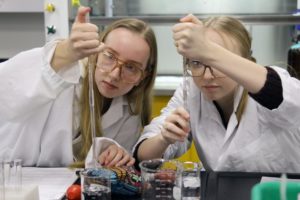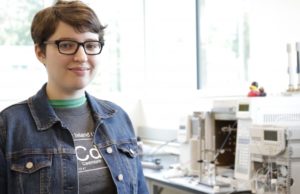The emerging disciplines of green chemistry and analytical chemistry are just two of several unique aspects of the new Bachelor of Science, Major in Chemistry degree program being offered at VIU this fall.
Natural Science and Engineering Research Council of Canada (NSERC) Undergraduate Student Research Award holder Misha Zvekic is excited to be among the first to graduate with Vancouver Island University’s (VIU’s) new Bachelor of Science, Major in Chemistry degree.
Zvekic had been working towards a minor in chemistry and a major in biology, but in her third year at VIU discovered her passion for chemistry. She is now transitioning to VIU’s newest degree option.
“This really came at the ideal moment,” says Zvekic. “It would have added a few more years to my degree pursuit if I had to transfer to another institution.”
The new major in chemistry was developed over the past several years and made possible with the opening of the Centre for Health and Science in fall 2018. The new degree program builds on existing strengths within the department and takes advantage of several emerging trends, including an emphasis on problem solving and critical thinking, the integration of experiential learning, and computer aided inquiry.
Curriculum development is being shared across the whole department as faculty refine existing courses and create senior, stand-alone, lab-only courses that integrate the sub-disciplines of chemistry: organic, inorganic, physical, analytical and biochemistry, which is also a unique feature of the new major at VIU.
The modern degree program will feature several distinctive courses, such as CHEM 300: Green Chemistry and Toxicology, which is being developed and taught by Dr. Alexandra Weissfloch, and CHEM 400: Emerging Topics and Professional Practice in Chemistry, a seminar-based course with special topics presented by faculty, students and guest lectures being developed by Dr. Jessie Key.
The top floor of the new building is entirely dedicated to chemistry. There are six large instructional labs, each equipped with fume hoods, which are ventilated enclosures used for working with volatile chemicals. Fourth-year students also now have their own special projects lab to conduct student centered research projects under the guidance of a faculty supervisor.
“We are really excited about designing new experiments that take advantage of this fabulous space and equipment and give the students the skills they need to be professional chemists,” says Dr. Todd Barsby, VIU Chemistry Professor and Department Chair. “Having so many well-appointed laboratories greatly expands the type of chemistry we can be doing, and the level of programming that we can offer.”
The expanded lab spaces and state-of-the-art equipment allow Zvekic to research how microplastics in the environment can change over time and how they can act as a means to transport contaminants within the environment on their surfaces.
“The fact that VIU offers a sophisticated, modern space for its students while still maintaining small class sizes and robust student-teacher interaction opportunities is going to do wonders for our chemistry graduates,” says Zvekic.

Dr. Erik Krogh, VIU Chemistry Professor and co-director of the Applied Environmental Research Laboratories (AERL), says one of the features that distinguishes the VIU Chemistry program from others in the province is an emphasis on the theory and practice of analytical and green chemistry. VIU is the second institution in Canada to join the Green Chemistry Commitment.
Students have the option to specialize in Environmental Chemistry or Biological Chemistry in their upper-level courses within the new major.
“That involves the study of the source, fate and distribution of molecules in the environment and biological systems, respectively,” explains Krogh. “The former is often in the context of pollutants in the environment, whereas the latter often describes chemical transformations in organisms or other biological systems in the context of health. Both rely heavily on analytical chemistry skills, which are highly transferable and employable.”
The major in Chemistry is closely integrated with the internationally recognized AERL, which provides authentic experiential learning opportunities with real-world outcomes in the areas of environmental chemistry and mass spectrometry. This facility provides hands-on experience and student-faculty engagement in the form of part-time work, internships and summer research assistantships for undergraduate students.
“It’s been amazing to have new research space for the AERL,” says Zvekic. “Due to limited space in the old labs, essential equipment had been scattered in storage rooms across campus. Now, if I need a particular instrument it is perhaps only a few doors away, which helps the workflow immensely.”
Krogh says when it comes to student career opportunities it is important they have the experience and skills employers and researchers are looking for.
“Of course, having hands-on experience, whether that is in a research lab or teaching lab, is the only way to develop those competencies, and also have experiences tailored for the current trends in the job market.”
“It’s also really exciting to know that you can plan a future project and there will be room for it and there is also space for new instruments,” says Barsby. “We are hoping to obtain a nuclear magnetic resonance spectrometer, a hallmark of chemical research which allows you to examine what molecules are in a sample and examine chemical structure.”
VIU is actively seeking support through the Imagine VIU Campaign to acquire additional research equipment to supplement the higher-level training of students. Over the last two years, generous supporters have helped the institution raise 80% of the campaign’s $5.5-million goal to equip and complete the new building and support students.
-30-
MEDIA CONTACT:
Annette Lucas, Communications Officer, Vancouver Island University
O: 250.741.2020 | C: 250.618.7296 | E: Annette.Lucas@viu.ca
